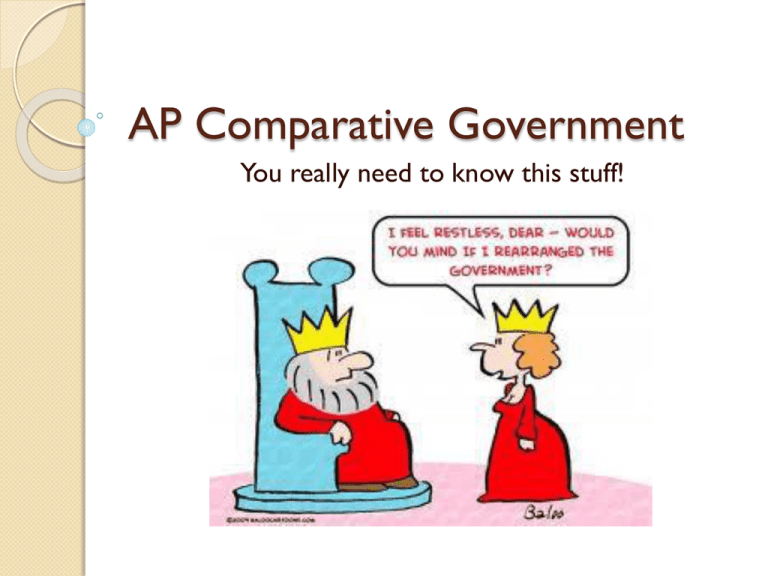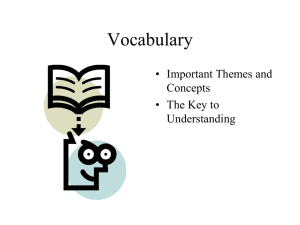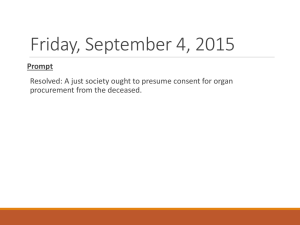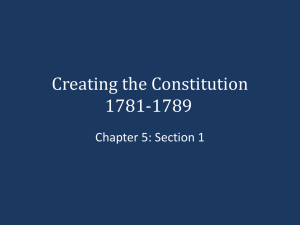AP Comparative Government
advertisement

AP Comparative Government You really need to know this stuff! States and Nations State-political institutions with a monopoly of force over territory Nation-a psychological sense of identity based on shared ethnicity, language, history or culture. Institutions Formal policymakers within the government, including the executive, legislature, judiciary and bureaucracy Regimes and Hybrid Regimes Regime-a government in which the system has not changed even though there have been different leaders. Hybrid regime-a government with both authoritarian and democratic elements. Legitimacy Legitimacy is the people’s belief that the government has the right to rule. Rational/legal-based on a fair and understandable system of laws that are followed and apply to everyone Traditional-because it has always been that way Charismatic-based on a ruler’s engaging personality Globalization and Sovereignty Globalization is the increasing interconnectedness of the world. Sovereignty is the ability of a government to rule without internal or external influence. Measurements HDI-Human Development Index measures life expectancy, birth and death rates, education, quality of life. GDP-the total value of goods and services produced in a country GDP per capita-GDP divided by the population Gini Index-measures income inequality Development Developed countries have high GDP per capita and HDI rankings; service-based economies. Developing countries are emerging economies; based on production. Underdeveloped countries have low GDP per capita and HDI rankings; agricultural. Least Developed-the poorest of the poor First World Problems Economics Political Economy is the relationship between government policies and the economy. Economic liberalization is the move to a free market by reducing tariffs, trade barriers, and government control over the economy. Economic Systems Market economies set wages, production, and prices based on supply and demand with less government interference. In command economies, the government makes decisions regarding wages, prices, and production, and private property is limited. Communism and Welfare States Communism is a system of government based on the writings of Karl Marx in which the stated goal is economic equality. In a welfare state, the government provides support to citizens, such as unemployment benefits and health care. Rentier States States that derive a significant portion of their revenues from rent (such as renting land to oil companies). Dependency Theory The idea that colonial rule left a legacy of political and economic dependence making it difficult for former colonies to improve their economies and democratize. Structural Adjustment Structural adjustment programs require countries to increase taxes and cut spending (austerity measures) to improve budgets. Post-Materialism Societies in which basic needs are met and citizens can concentrate on higher goals, like the environment Democratization The transition from an authoritarian state to an illiberal democracy to a liberal democracy Authoritarian State A government where elections are not free and fair and civil rights and liberties are lacking Illiberal/Procedural Democracy A government with elections that are not completely free and fair or lacking some civil rights and liberties Liberal/Substantive Democracy A government with free and fair elections and civil rights and liberties Transparency The ability of citizens to see what the government is doing Civil Rights and Liberties Civil rights are protections granted by the government to prevent discrimination against groups, like ethnic or religious minorities and women. Civil liberties protect individuals from government infringement, like free speech. Systems of Government In a Unitary System, all power is held by the central government and state power is not protected. In a Federal System, power is shared between the national and state government and some state power is protected. Devolution occurs when the national government grants more power to states. Legislatures A bicameral legislature has two houses, and a unicameral legislature has one. FPTP/SMD awards one seat to the candidate with the most votes in a district. Proportional Representation awards sets to political parties based on the percentage of votes received; there may be a threshold for getting seats. Referendum A measure sent by the legislature to the citizens for approval The Judiciary In common law systems, court decisions are written down and serve as precedent for future cases. Code law systems are based on rules written by the legislature. Judicial review is the ability of a Supreme Court to overturn a law or executive action if is is unconstitutional. Theocracy A state led by religious rulers, like Iran Revolutions and Coups A revolution is an overthrow of the government based on broad popular support. A coup is a change in the leader brought about by a small group, often a military leader. Nationalism The belief that a group of people has its own unique destiny, often including a desir for a separate state Ideology and Socialization Political ideology is an individual’s belief system about the role of government. Political socialization is the process through which an individual acquires his or her political beliefs and behaviors. Political culture is the shared beliefs of a group of people. Political Ideologies Political Right favors the status quo/conservatives). Political Left favors change. They usually favor social programs. Reactionaries are extreme and want to go back to the past. Liberalism-favor freedom in the economy and in civil rights and liberties Cooptation and Corporatism Cooptation is when the government buys off its critics. Corporatism is when large businesses and labor unions are brought into the policymaking process. This limits pluralism because small actors are left out. Pluralism is when many groups compete in policymaking. Political Recruitment The process for selecting current and potential leaders, including formal and informal power structures Citizen Involvement Civil Society consists of voluntary associations outside of government control which strengthen society. Grassroots movements occur when ordinary citizens push for reform. Cleavage (it’s not what you think) A political cleavage is a division over a policy issue. Cross cutting cleavages bring different kinds of groups together, strengthening society. Coinciding cleavages exacerbate feeling of difference, weakening society. Causation and Correlation Causation is when a change in one variable precipitates a change in another variable. Correlation is an apparent connection between variables. Causation and correlation may be positive (in the same direction) or negative (in opposite directions). Normative and Empirical Statement An empirical statement is a verifiable fact. A normative statement is a judgment about what should be.






